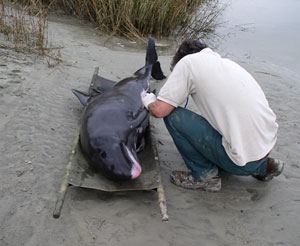This website was designed to provide access to marine mammal stranding records to state data managers and the public. Additionally, we have attempted to provide educational information about marine mammals that have either stranded on Georgia’s coast or could be seen off Georgia's coast.
In 1989, the Georgia Marine Mammal Stranding Network was created to organize responses to stranded marine mammals on the coast of Georgia. Since 1992, the Georgia Department of Natural Resources Nongame Conservation Section has led this effort. They help coordinate between the National Oceanic and Atmospheric Administration (NOAA) and other federal, state, and private organizations. The Network hopes to learn from marine mammal strandings by collecting information and samples from stranded individuals, documenting human caused impacts on marine mammals, monitoring population health, and providing information to the public about marine mammals.

Pygmy Killer Whale Feresa attenuata stranded on Georgia's coast.
Information from marine mammal stranding records has provided much of the information we have about the life histories, ages, and sizes of marine mammals worldwide. For species that are rarely seen, stranding information provides almost all of the knowledge we have about them. Some strandings also show the impacts humans have had on marine mammals, such as entanglements in fishing gear, boat strikes and consumption of human produced debris.
Database
The earliest documented record of a stranding in Georgia, based on literature, is a Cuvier's beaked whale (Ziphius cavirostris) found on the coast of St. Simon's Island in 1893 (Neuhauser and Ruckdeschel, 1978). Systematic recordkeeping began in the United States in 1977 by the National Marine Fisheries Service (NMFS). Currently, the Georgia Marine Mammal Stranding Database includes over 900 records from 1977 to present day. These records includes whales, dolphins, and porpoises (cetaceans), except one record of a harbor seal (Phoca vitulina). Most of the stranding records (over 50%) are bottlenose dolphins (Tursiops truncatus).
Citations
Neuhauser, H. and Ruckdeschel, C. 1978. Whales (Cetacea) of Georgia. R.R. Odum, L. Landers (Eds.), Proceedings of the Rare and Endangered Wildlife Symposium, Athens, Georgia, 3-4 August 1978, pp. 38-53.

 Marine Mammals of Georgia
Marine Mammals of Georgia